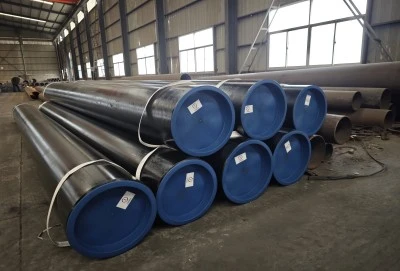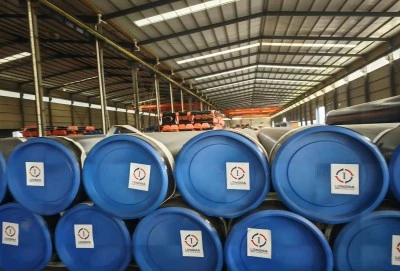Protecting steel pipes from corrosion is crucial for maintaining the integrity and longevity of industrial infrastructure. The most effective methods include applying protective coatings, implementing cathodic protection systems, and conducting regular maintenance. anti-corrosion steel pipes are specifically designed with advanced coatings and treatments to withstand harsh environments. These pipes are essential in industries such as oil and gas, water supply, and offshore construction, where exposure to corrosive elements is constant. By employing a combination of these protective measures, engineers and project managers can significantly extend the lifespan of steel pipelines and reduce long-term maintenance costs.
|
|
|
Essential Coating Techniques for Steel Pipes
Fusion Bond Epoxy: The Industry Standard
Fusion Bond Epoxy (FBE) coating pipe has become the gold standard in pipe protection across various industries. This thermosetting polymer coating creates a robust barrier against corrosive elements, offering exceptional adhesion to steel surfaces. The application process involves electrostatically charging dry epoxy powder and spraying it onto preheated pipes. The heat causes the powder to melt and flow, forming a uniform, smooth coating that cures rapidly.
FBE coatings excel in providing resistance to chemicals, abrasion, and impact. They maintain their protective properties across a wide temperature range, making them suitable for diverse applications, from buried pipelines to offshore installations. The coating's flexibility allows it to withstand pipe movement without cracking or peeling, ensuring long-term protection.
Galvanization: Zinc-Based Protection for Steel
Galvanization is a time-tested method for protecting steel pipes against corrosion. This process involves applying a layer of zinc to the steel surface, either through hot-dip galvanization or electroplating. The zinc coating acts as a sacrificial anode, corroding preferentially to protect the underlying steel.
Hot-dip galvanization, where pipes are immersed in molten zinc, provides a thicker, more durable coating suitable for harsh environments. Electroplating offers a thinner, more uniform coating ideal for precision applications. Galvanized pipes are widely used in water distribution systems, construction, and industrial applications where moderate corrosion resistance is required.
Advanced Polymer Coatings for Harsh Environments
In extremely corrosive environments, such as offshore oil platforms or chemical processing plants, advanced polymer coatings offer superior protection. These coatings, including polyurethanes, epoxy phenolics, and fluoropolymers, provide exceptional resistance to chemicals, high temperatures, and abrasive conditions.
Multi-layer coating systems, combining different polymers, are often employed to maximize protection. For instance, a typical system might include an FBE base coat for adhesion, followed by a polyethylene layer for impact resistance, and a final polyurethane topcoat for UV protection and aesthetic finish. These sophisticated coating systems can extend pipe lifespans significantly, even in the most challenging operational conditions.
Cathodic Protection: A Comprehensive Guide
Impressed Current Systems for Large-Scale PipelinesImpressed Current Cathodic Protection (ICCP) systems are highly effective for protecting extensive pipeline networks against corrosion. This method involves applying a small electrical current to the pipeline, making it cathodic relative to its surrounding environment. The current is supplied by an external power source and distributed through anodes placed strategically along the pipeline route.
ICCP systems offer several advantages for large-scale applications. They can be adjusted to provide optimal protection levels across varying soil conditions and pipeline lengths. The ability to fine-tune the current output allows operators to respond to changing environmental factors or pipeline conditions over time. This flexibility makes ICCP particularly suitable for long-distance oil and gas pipelines, where soil composition and moisture levels can vary significantly along the route.
Sacrificial Anodes: Cost-Effective Corrosion Prevention
Sacrificial anode systems provide a simpler, yet effective method of cathodic protection, particularly for smaller pipeline sections or in remote locations where power sources are unavailable. This technique utilizes anodes made from metals with a more negative electrochemical potential than steel, such as magnesium, aluminum, or zinc.
When connected to the steel pipe, these anodes corrode preferentially, directing the corrosive process away from the pipeline. The simplicity of sacrificial anode systems makes them cost-effective and low-maintenance, ideal for offshore platforms, buried tanks, and localized pipeline sections. However, they require periodic replacement as the anodes deplete over time, necessitating ongoing monitoring and management.
Monitoring and Maintaining Cathodic Protection Systems
Regular monitoring and maintenance are crucial for ensuring the continued effectiveness of cathodic protection systems. This involves periodic surveys to measure pipe-to-soil potentials, current outputs, and anode consumption rates. Advanced monitoring techniques include the use of remote monitoring systems that provide real-time data on protection levels and system performance.
Maintenance activities may include adjusting current outputs in ICCP systems, replacing depleted sacrificial anodes, and repairing or upgrading system components. Proper documentation and analysis of monitoring data help in predicting future protection requirements and optimizing system performance. By implementing a robust monitoring and maintenance program, pipeline operators can ensure consistent corrosion protection and extend the operational life of their assets.
Maintenance Tips to Extend Steel Pipe Lifespan
Regular Inspections: Detecting Early Signs of CorrosionImplementing a rigorous inspection schedule is paramount in preserving the integrity of steel pipelines. Regular inspections allow for the early detection of corrosion, preventing minor issues from escalating into major problems. Advanced inspection techniques such as ultrasonic testing, magnetic flux leakage, and smart pig technology enable thorough examination of both internal and external pipe surfaces.
Visual inspections, while basic, remain crucial for identifying surface-level corrosion, coating damages, or environmental factors that might accelerate corrosion. Developing a comprehensive inspection plan that combines various methods and frequencies based on the pipeline's age, location, and operating conditions is essential for effective corrosion management.
Proper Insulation Techniques for Metal-to-Metal Contact
Metal-to-metal contact in pipeline systems can lead to galvanic corrosion, where one metal corrodes preferentially to another. Proper insulation techniques are vital in preventing this type of corrosion. Using dielectric materials to separate dissimilar metals, such as at flanged joints or valve connections, can significantly reduce the risk of galvanic corrosion.
Insulating gaskets, sleeves, and washers are commonly employed to create barriers between different metal components. In addition to physical insulation, careful material selection in pipeline design can minimize galvanic potential differences. Properly insulated systems not only prevent corrosion but also contribute to the overall efficiency and longevity of the pipeline infrastructure.
Chemical Treatments: Inhibitors and pH Control
Chemical treatments play a crucial role in internal corrosion prevention for steel pipes. Corrosion inhibitors are substances that, when added to a fluid in small concentrations, significantly decrease the corrosion rate of metals exposed to that fluid. These inhibitors work by forming protective films on metal surfaces or by altering the characteristics of the corrosive environment.
pH control is another critical aspect of chemical treatment. Maintaining the pH of fluids within pipelines at optimal levels can significantly reduce corrosion rates. This often involves adding alkaline substances to increase pH in acidic environments or using pH stabilizers to maintain consistent levels. Implementing a well-designed chemical treatment program, tailored to the specific pipeline conditions and transported fluids, can substantially extend the operational life of steel pipes.
Protecting steel pipes from corrosion requires a multifaceted approach combining advanced coating technologies, cathodic protection systems, and diligent maintenance practices. By implementing these strategies, industries can significantly extend the lifespan of their pipeline infrastructure, ensuring operational efficiency and safety. Regular inspections, proper insulation, and targeted chemical treatments further enhance corrosion resistance. As corrosion prevention technologies continue to evolve, staying informed about the latest advancements and best practices is crucial for professionals in pipeline management and engineering fields.
Anti-Corrosion Steel Pipe For Sale
Hebei Longma Group offers top-quality anti-corrosion steel pipes designed to withstand the harshest environments. Our advanced production equipment, imported from Germany and complemented by our independently developed technologies, ensures superior product quality. With a professional team of over 300 employees, including 60+ technical experts, we guarantee innovation and excellence in every pipe we produce.
Our comprehensive testing facilities, featuring ultrasonic flaw detectors and industrial X-ray equipment, ensure each pipe meets the highest standards. We pride ourselves on fast delivery, with standard thickness pipes ready in as little as 7 days. Our products are backed by complete certifications, including API 5L, ISO 9001, ISO 14001, and more, meeting global quality standards.
Our competitive pricing, resulting from stable raw material partnerships and efficient production processes, makes us an ideal choice for your steel pipe needs. To learn more or request a quote, contact us at info@longma-group.com.














